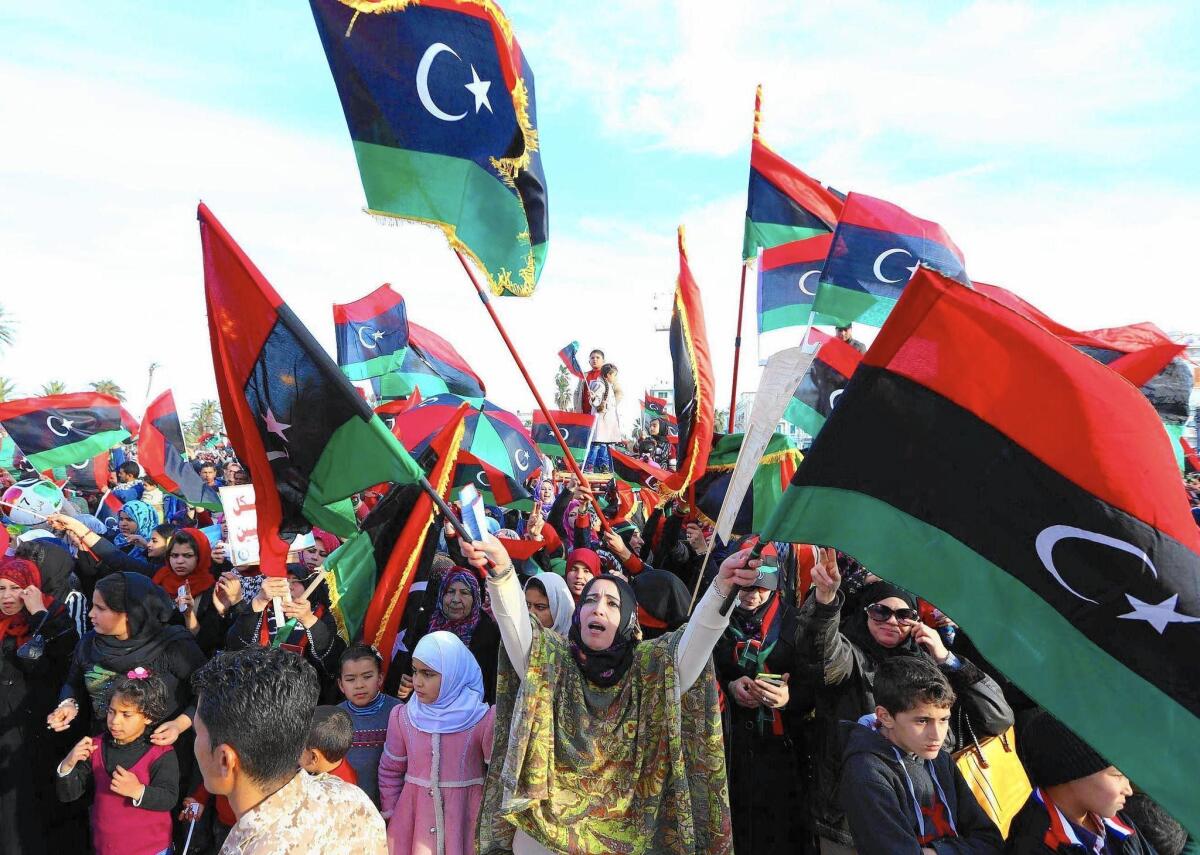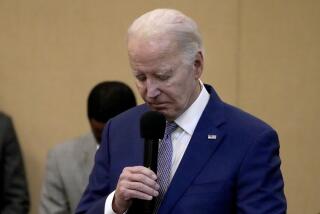Despite Libya’s worsening violence, Western intervention unlikely

When Libya appeared on the edge of a humanitarian disaster during its 2011 civil war, President Obama and other Western leaders sent in the cavalry: NATO warplanes with orders to protect civilians from slaughter by the country’s longtime leader, Moammar Kadafi.
But though worsening violence this week brought new calls for foreign intervention, world powers are unlikely to fly to the rescue again. In the view of U.S. officials and allies in Europe and the Middle East, an outside force would be costly, hard to organize and deploy, and could deepen Libya’s divisions.
The chance of a new intervention “is pretty remote,” said Frederic Wehrey, a Middle East analyst at the Carnegie Endowment for International Peace in Washington.
It’s far more likely, say diplomats and analysts, that the United States and other world powers will continue their long, so far unsuccessful, search for a diplomatic solution to the country’s post-Kadafi civil war, possibly backed by economic sanctions to enhance leverage.
U.S. officials are closely monitoring the growing influence of Islamic State in Libya and could decide to use counter-terrorism tools, such as drone strikes and special forces, as they have done in Yemen, Somalia and elsewhere.
But “no decisions have been made to expand the fight against [Islamic State] beyond Iraq and Syria,” Rear Adm. John Kirby, the chief Pentagon spokesman, said Wednesday.
Libya, Egypt, Italy and France all called for some kind of foreign intervention after Islamic State released a video Sunday that purports to show masked militants beheading 21 Egyptian Christians on a Libyan beach.
Advocates say an outside force is needed to halt Islamic State from expanding in Libya. Some also argue that foreign intervention can provide enough security to allow government institutions to take root amid the chaos.
Arab leaders on Wednesday called on the U.N. Security Council to lift weapons sanctions against Libya to help its army fight Islamic State and warned that the beheadings of the Egyptian Christians threatened to expand Libya’s civil war into a regional military conflict.
After Kadafi was overthrown, control of the North African nation devolved to a patchwork of militias loosely organized into two coalitions, each affiliated with a rival government.
One, based in western Libya and called Libyan Dawn, includes moderate and radical Islamists. The second, based in the eastern city of Tobruk, has declared opposition to the Islamists and is allied with Libya’s internationally recognized government.
Advocates say an international “stabilization” force could protect key Libyan assets, such as the seat of government, airports and oil fields, which provide most of the country’s wealth.
Another option would be to field an air force to bomb Islamic State targets, as Egyptian warplanes did Monday to retaliate for the massacre of Egyptian Christians.
But many Libyans would regard any outside force as neocolonialist meddling. Libyan and foreign Islamist fighters would rally against it.
Major powers probably wouldn’t send an international force without a written agreement from Libya’s groups accepting its presence and spelling out its mission. That could be difficult to negotiate.
Many countries are likely to resist calls to send troops. Officials in Italy, the former colonial power in Libya, appear divided on whether they should provide troops to an international force.
Other European officials, preoccupied with the war in Ukraine, say privately they don’t want to shoulder the cost of such a mission even though Libya lies on their doorstep.
A United Nations authorization for such a force, which the North Atlantic Treaty Organization had in 2011 for its air campaign, would be difficult to win. Russia, which holds veto power in the Security Council, has condemned the 2011 campaign and said it would not support a repeat.
Nor are the military options appealing. Islamic State forces are small and easily dispersed, and the West is likely to get limited help from other groups.
Another possible option is for the United States and Europe to team up with Egypt, which has vowed to continue fighting Islamic State in Libya, its western neighbor.
But Egypt is strongly committed to Libya’s anti-Islamist forces. So any partnership with Western countries could be seen as a hostile act by the Libyan Dawn coalition.
“It could be a disaster,” Wehrey said.
Times staff writers W.J. Hennigan in Washington and Tina Susman at the United Nations contributed to this report.
More to Read
Start your day right
Sign up for Essential California for news, features and recommendations from the L.A. Times and beyond in your inbox six days a week.
You may occasionally receive promotional content from the Los Angeles Times.







